The Seagate BarraCuda (500GB) SSD Review: Getting Back In The Game
by Billy Tallis on December 7, 2018 8:00 AM ESTAnandTech Storage Bench - Light
Our Light storage test has relatively more sequential accesses and lower queue depths than The Destroyer or the Heavy test, and it's by far the shortest test overall. It's based largely on applications that aren't highly dependent on storage performance, so this is a test more of application launch times and file load times. This test can be seen as the sum of all the little delays in daily usage, but with the idle times trimmed to 25ms it takes less than half an hour to run. Details of the Light test can be found here. As with the ATSB Heavy test, this test is run with the drive both freshly erased and empty, and after filling the drive with sequential writes.
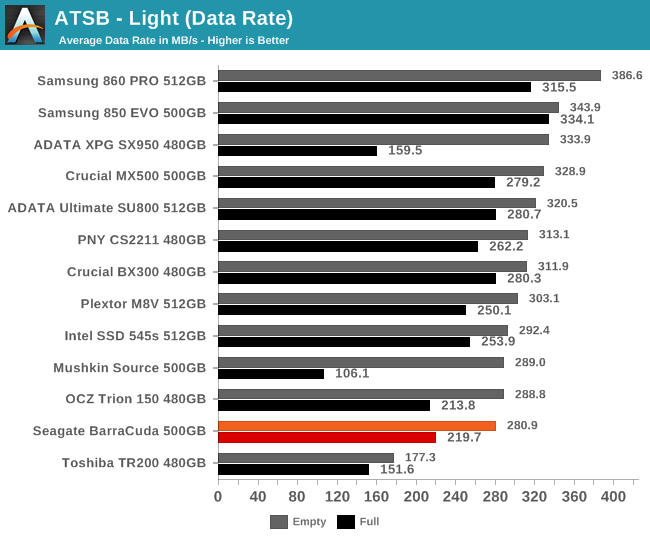
The Seagate Barracuda's average data rate on the Light test is the slowest among mainstream SATA drives, at about 15-20% slower overall than the best SATA drives with TLC NAND.
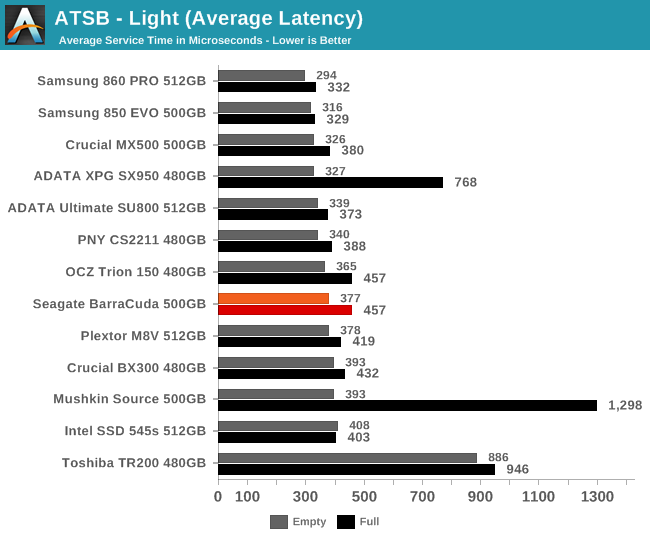
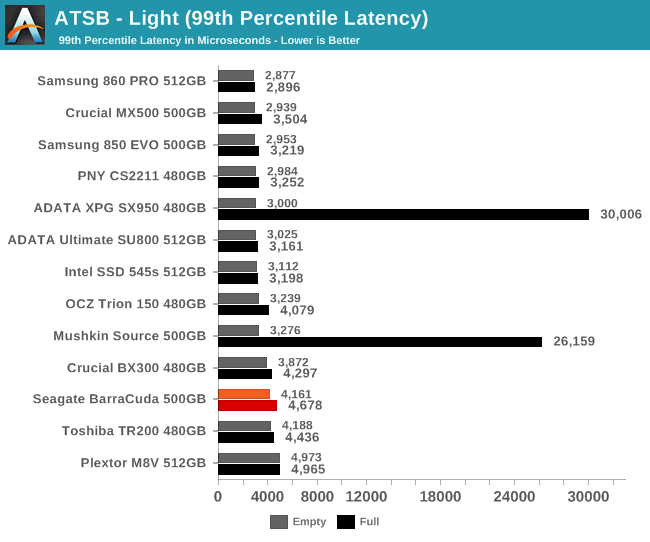
The average latency from the BarraCuda during the Light test is higher than some of the best mainstream drives like the Crucial MX500, but not high enough to be a concern. The 99th percentile latency scores are worse by than most of the competition by at least 1ms, which suggests that the BarraCuda might have some very mild stuttering, but nothing like what the Mushkin Source or ADATA SX950 exhibit when full.
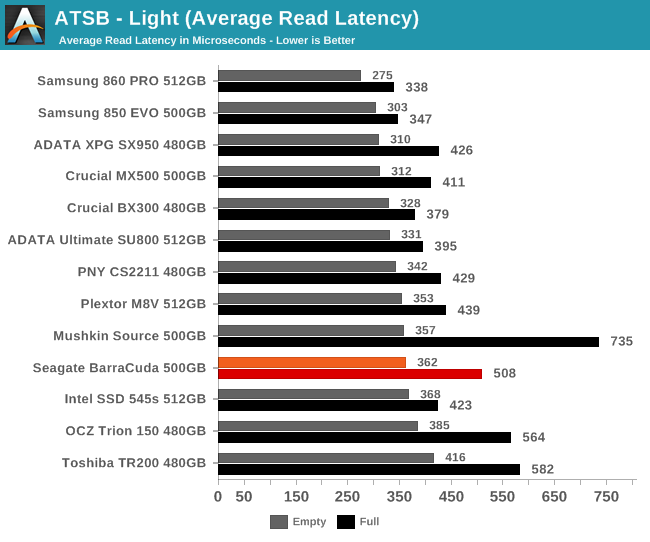
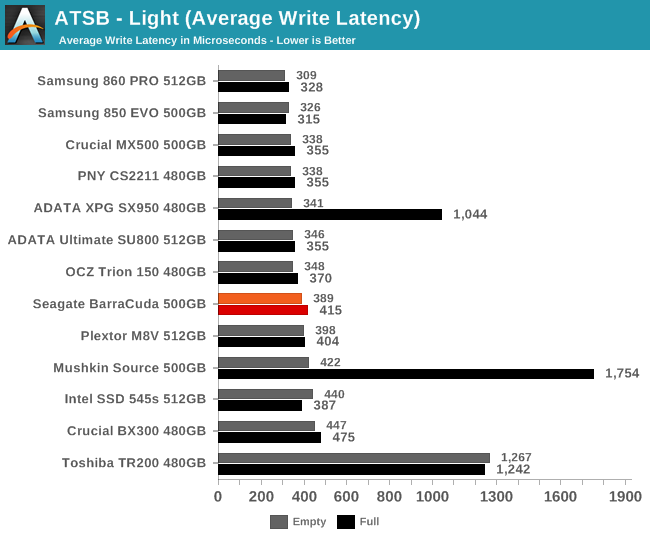
The average read and write latencies from the BarraCuda aren't top notch but still mostly fall within the normal range for mainstream SATA drives. The read latency takes a fairly large hit when the test is run on a full drive, leaving it slower than any recent mainstream drive, but still faster than the two DRAMless SSDs.
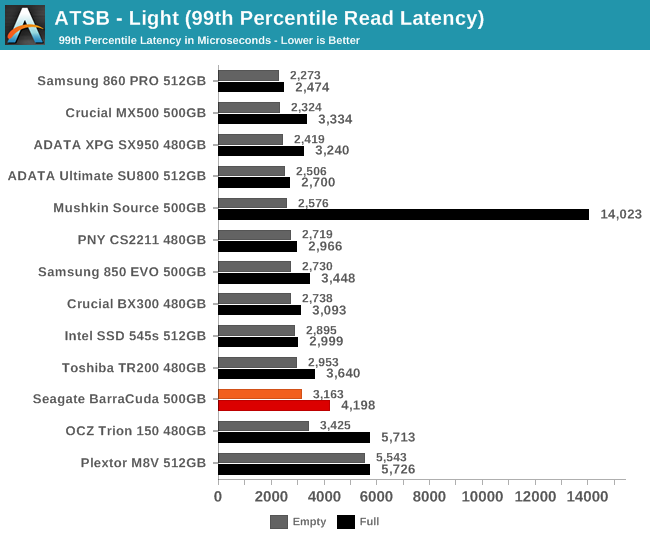
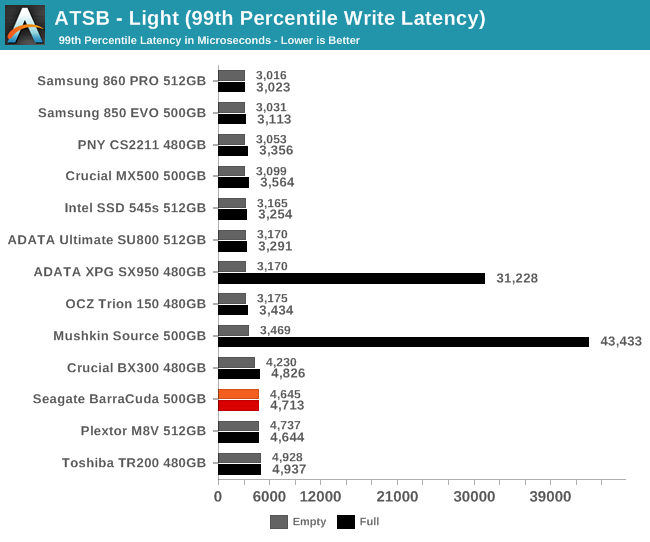
The 99th percentile read and write latency scores for the BarraCuda both show that the BarraCuda is slightly slower than its competition, but not by enough to be a serious problem.
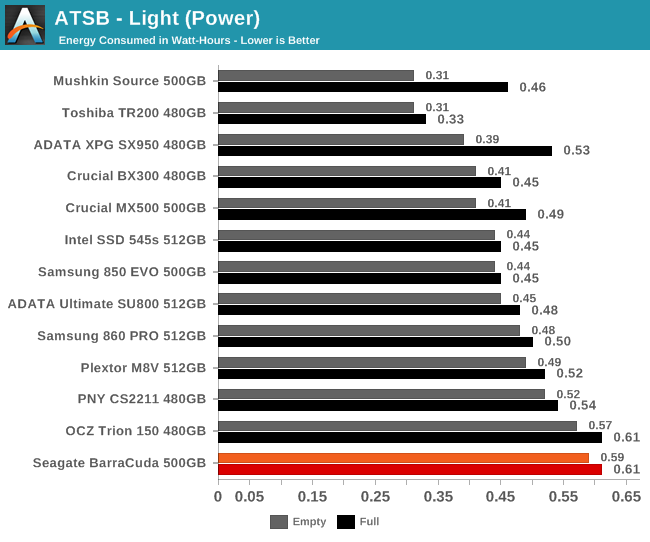
The Seagate BarraCuda is the least energy-efficient drive in this bunch, due in part to its low performance, but high power consumption under load is the bigger factor on this test.










39 Comments
View All Comments
automator_devops - Friday, December 7, 2018 - link
Looking forward to these being the first SSDs exhibiting the "click of death". Makes no sense I know, low quality humor. I actually do have a Seagate Archive 8TB in my case.Donkey2008 - Thursday, December 13, 2018 - link
If any manufacturer could accomplish this it would definitely be Seagate. They are the Hynix of hard drives - Mostly OEM, not reliable and shockingly still in business. I wouldn't buy anything from that company if my life depended on it.Donkey2008 - Thursday, December 13, 2018 - link
Oh, and I laughed when I first read your comment :-)aylak - Friday, December 7, 2018 - link
I owned several mechanical hard drives from Seagate and all of the failed at some point. I know it doesn't mean that their SSD drives will be as unreliable but it is funny that first thing came to my mind is this as I saw the title.Alim345 - Saturday, December 8, 2018 - link
There was one particularly unreliable series of those hard drives. Also HDD are not absolutely reliable and will inevitably fail after some timeBeaver M. - Wednesday, December 12, 2018 - link
Indeed. Yet Seagate wasnt very good at that either. They had far higher failure rates than WD and even Samsung (which also werent great).But its good to see that this seems to have changed. At least with their bigger drives. They seem to be on par with WD now, but WD isnt as good as it was a few years ago. I guess this HDD cartel made them sloppy.
Thats why I bought a Toshiba and HGST (shortly before they rebranded them as WD).
KAlmquist - Sunday, December 9, 2018 - link
When it was an independent company, Sandforce never demonstrated the ability to effectively test and debug their products. So the good think about Seagate going with a time-tested Toshiba controller is that it's possible to buy these drives and be confident that they will work correctly. If Seagate drops the price to the point where these drives represent a good value for the money, I would have no problem recommending them.III-V - Sunday, December 9, 2018 - link
Bit hard to read the article title on the front page -- white text on white photo doesn't really work!Billy Tallis - Monday, December 10, 2018 - link
There's supposed to be a partially transparent dark overlay at the bottom of the photo to serve as a background for the title text. Try re-loading the page, and if it still doesn't render, send us a bug report with a screenshot.